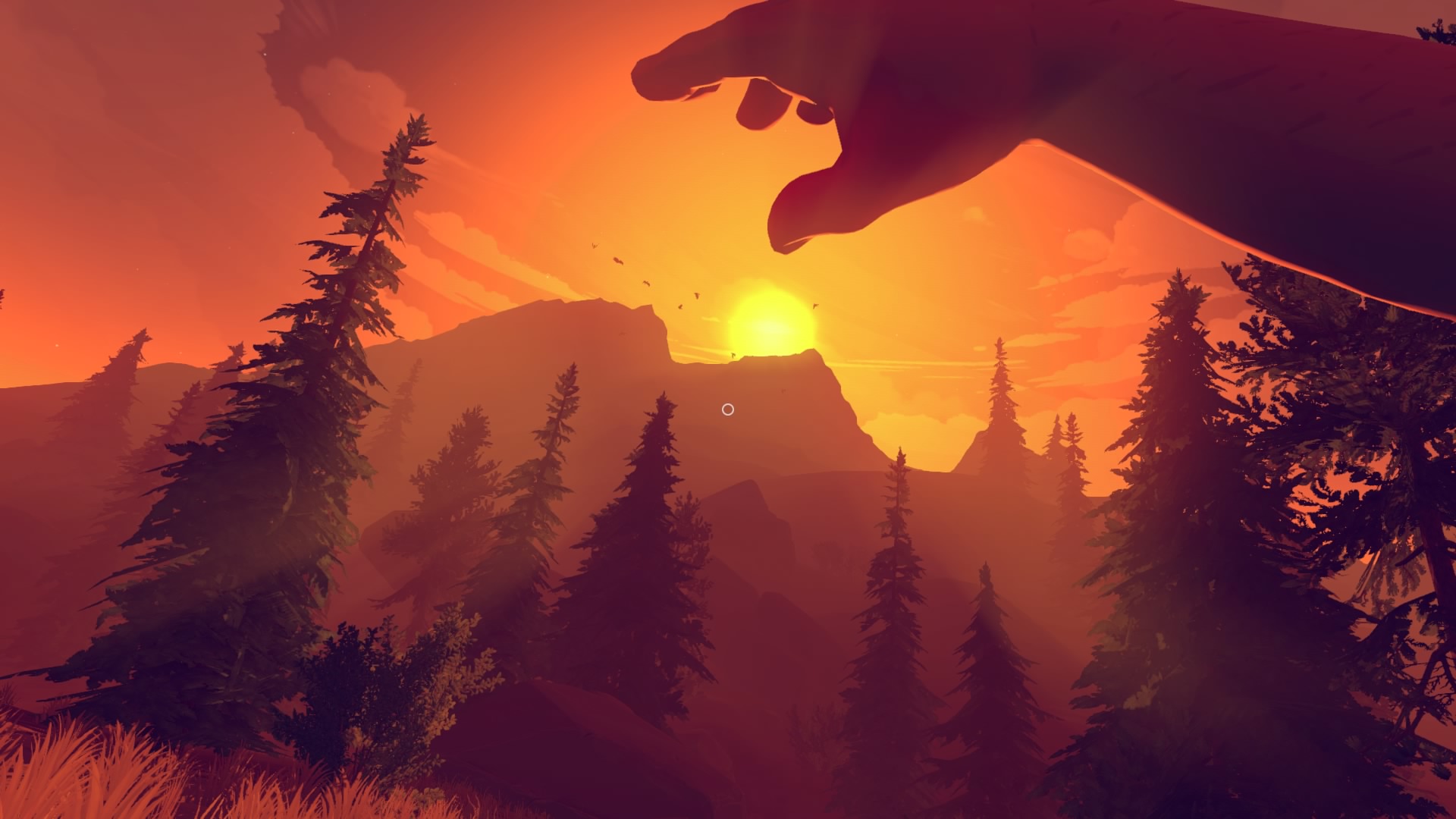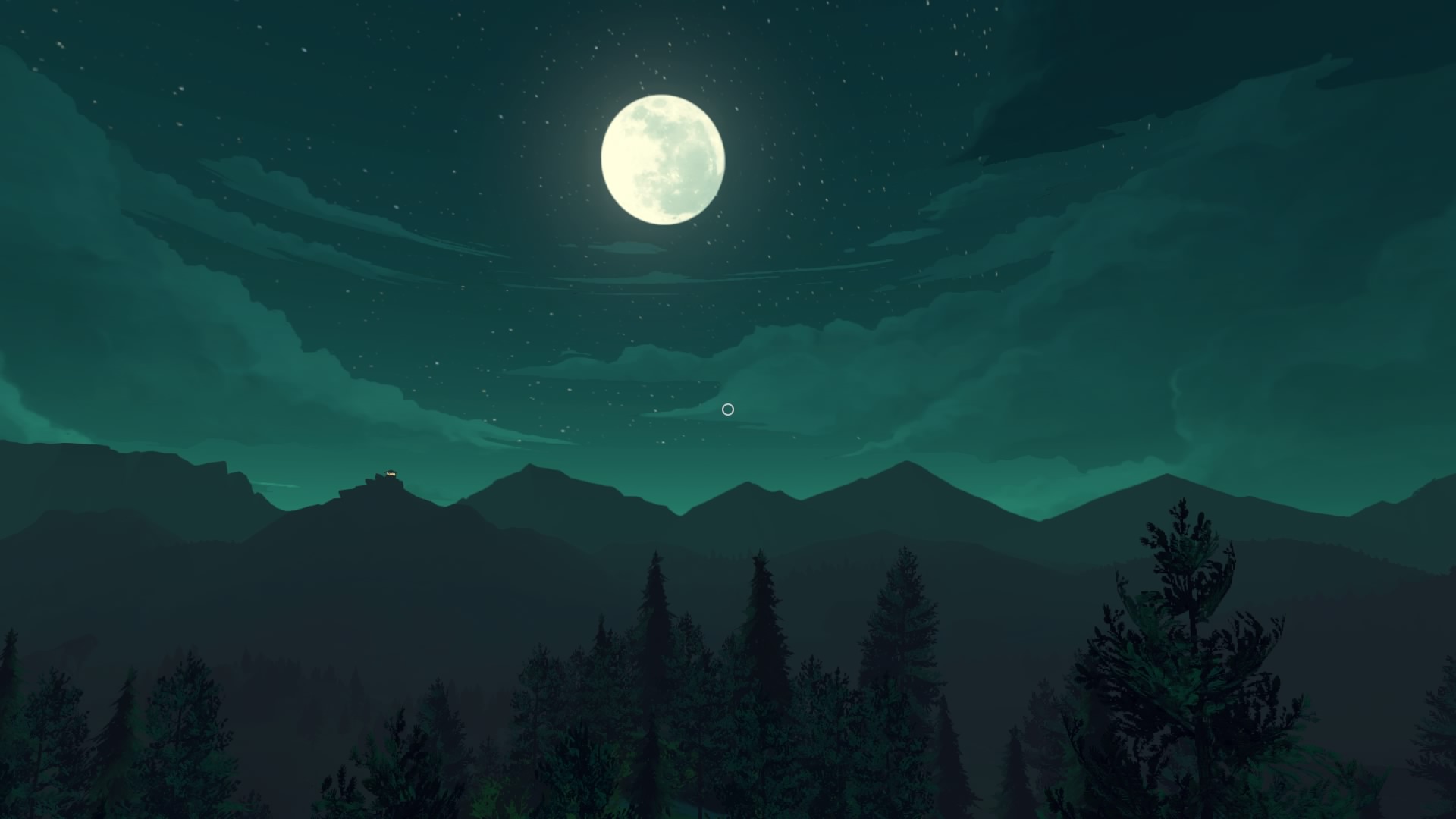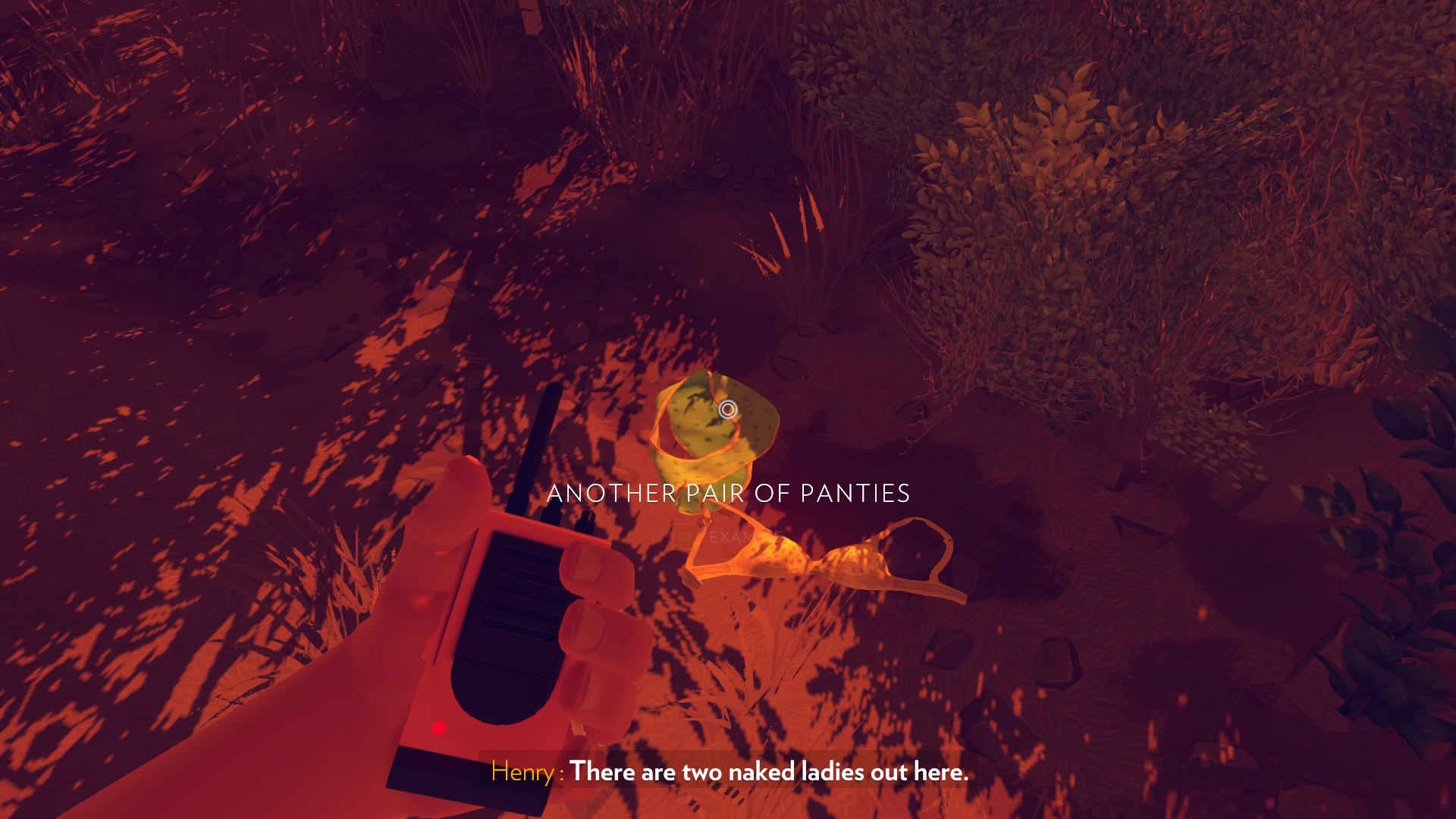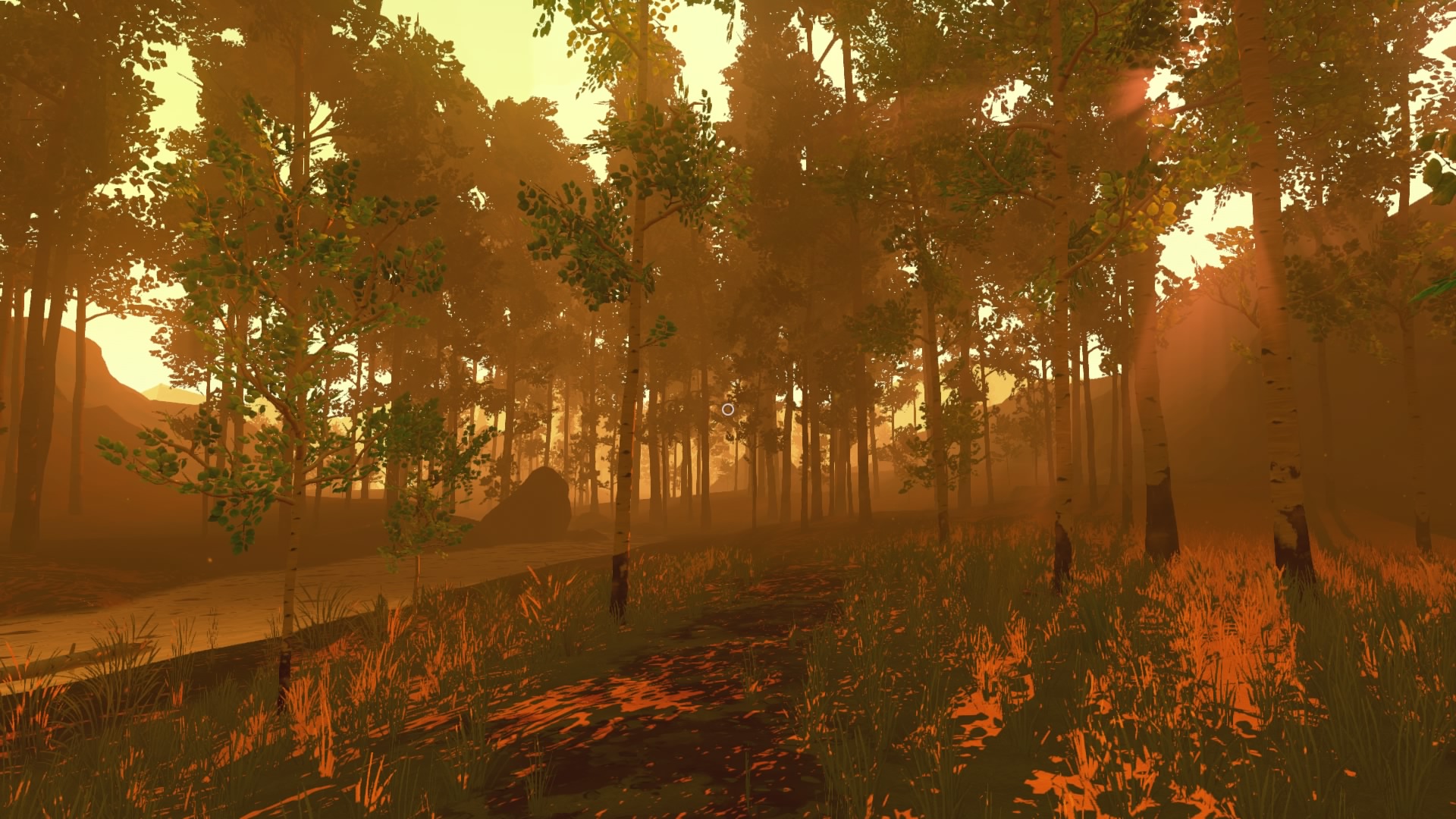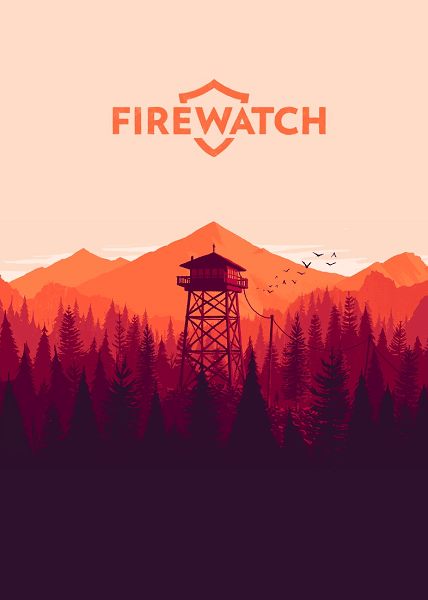
Firewatch – A beautiful world hides troubled people
****
Reviewed June 10, 2016 on PlayStation 4
Leave a comment on Giant Bomb
Firewatch in set in the late 1980s, and the main character Henry has taken a summer job in Wyoming. The job description is simple: watch the forest in near total isolation (save for radio contact with Delilah, a more senior member of the service), and report signs of fire to the park service. It should be the perfect place to escape, and hide, from one's problems, but mysterious events start to occur almost as soon as Henry arrives his lookout tower.
From the first moments in the Wyoming wilderness, Firewatch is visually arresting. The persistent use of yellow and orange hues during the day serve to make the forest seem warm and inviting, and also serve as a subconscious reminder to both Henry and the player that the area could easily be ablaze. These shades give way to cool blues and greens at night, revealing the forest to be foreboding and mysterious, and that it should be avoided where possible. This use of colour, coupled with excellent art direction, makes the world of Firewatch fun to explore, even if there is nothing in particular to be found. There is a certain joy to seeing the natural world rendered this way; a fact the game takes full advantage of by giving the player an in-game camera about halfway through the game.
Sadly, the art style is let down on the technical side. On the PlayStation 4 (the platform used for this review), shadows are extremely low-resolution, and stand out against the otherwise stunning backgrounds. Ordinarily, this would be a minor issue, but in a game where part of the appeal comes from just experiencing the art, it is a let-down. Furthermore, the frame rate on the PS4 often stutters, which can be rather jarring and completely breaks the immersion. This frequency of these stutters can be reduced (though not removed entirely) by disabling auto-saves, but this feels like a poor solution. Neither of these things prevented me from enjoying the game, but it was certainly disappointing to see.
On the exploration side, there is not a huge amount to discover by going off the main path, and the game at times feels oddly linear. This perhaps should not be too much of a surprise - after all, most areas of forest wildlands are going to look the same - but a little more variety in areas that aren't encountered as part of the narrative would have made exploration feel more rewarding. I did, near the start of the game, stumble upon a small cabin in the woods that is not otherwise seen, which lead to Delilah relaying to me the story of its prior occupant which was both interesting and amusing. Unfortunately, side stories and events only found by exploring the wilderness were rather uncommon.
Discovering this side story also revealed some of the mechanical limits of how Firewatch's narrative is presented. Almost all of the game is told through radio conversations with Delilah, and it unfolds in a largely linear manner with occasional choices from the player, much akin to how a recent Telltale game or visual novel is presented. Most of the time, this is an effective way to communicate the story, as having only radio communications with a single person adds to the feel of isolation that the game builds over its four to five hour length.
However, as I was listening to Delilah tell this side story, I was wandering back towards Henry's lookout tower, and encountered a figure on a rocky outcrop in front of me. Due to the preceding events (which I shan't spoil here), this was a significant moment to both Henry and Delilah, and I was given the option to tell Delilah about the person I found. As with the Telltale games, choices in Firewatch are timed, and if you do not make a choice within the time limit, the story continues on with Henry saying nothing. Unfortunately, as Delilah was locked in to regaling me with this interesting, but ultimately irrelevant, tale, I was unable to choose the option to tell her about the person. I felt an odd sense of betrayal - the game encourages exploration, but then punishes it by making story choices impossible to choose. Though this was a one-off event, I did later in the game experience multiple occasions where I was intending to pick one of the choices, but accidentally looked at a different object and Henry spoke about that instead. This didn't change the options available to me, but did result in some dialogue playing out in an unnatural order, which is disappointing but not a critical flaw.
The narrative is the lynch-pin that holds Firewatch together, and it does so admirably, though in a way that I suspect will not be to everyone's taste. The introduction to the game takes on a completely different style to the rest of the game, and sets up Henry's backstory. Rather than being a first-person adventure game, the introduction is essentially a brief text adventure, of Henry first meting the love of his life, of settling down, and ultimately of Henry's wife, Julia, falling seriously ill. I'm a little conflicted on this segment - whilst playing, my immediate thought was that the game was laying it on way too thick too soon, and that it was trying to get an emotional reaction out of me despite having never met either Henry or Julia outside a few short lines of text. It felt rather flat and ham-fisted. In hindsight though, I realised that the problems Henry faced in that introduction wasn't the story Firewatch was trying to tell; it was actually telling the story of how Henry takes the Wyoming job as way to hide from those problems, and the events that take place as a result. In that context, the very brief amount of time spent on the introduction makes sense, though doesn't provide the smoothest way into the game.
The first part of the game shows Henry become acquainted with life in the forest. The interactions between Henry and Delilah are extremely well-done; the writing is sharp and the voice acting is excellent, facts which continue through the rest of the game. Quickly mysterious events begin to take place, such as finding a backpack belonging to the son of a former lookout, and other more serious events I shall not spoil her. The game does a magnificent job of building the tension, as Henry and Delilah try to work out what is happening and become increasingly paranoid. The use of subtle sounds cues and a minimalist soundtrack amplifies that tension, and the once welcoming forest that was joyous to just explore suddenly feels very lonely.
Where I think that game may lose some people is that it is not what it first seems, and actively works to subvert expectations throughout. The level of tension, and items that Henry discovers in the world, lead the player to expect a grand overarching conspiracy with Henry and Delilah at the centre. Whilst presenting that to the player, the game is actually building towards a smaller, but more personal, conclusion that may feel somewhat underwhelming compared with how the mystery is presented to that point. This could have been a perfect way to end the game - the conclusion offered is a near-direct parallel of Henry hiding from his problems, and the level of dread felt by Delilah and Henry results from them in some way subconsciously wanting there to be a grand malicious plan, allowing them to continue running from their issues and providing a distraction from them. Unfortunately, it doesn't quite come together; the number of red herrings that don't entirely make sense in this context, or plot threads that are quietly not brought up again means that looking back on the narrative as a whole is not entirely satisfying.
Overall, none of the issues prevent me from recommending Firewatch. The technical shortcomings do not overshadow the fact that the game is gorgeous, a fact that should be obvious even in screenshots. Though the landing is somewhat fumbled, the story wraps up in a meaningful way and achieves its intended effect. Coupled with excellent characterisation, it is a beautiful and painful look at how people try to hide from their problems, and the way people isolate themselves to hide their guilt and personal failings. Despite its issues, it is certainly an excellent game.
